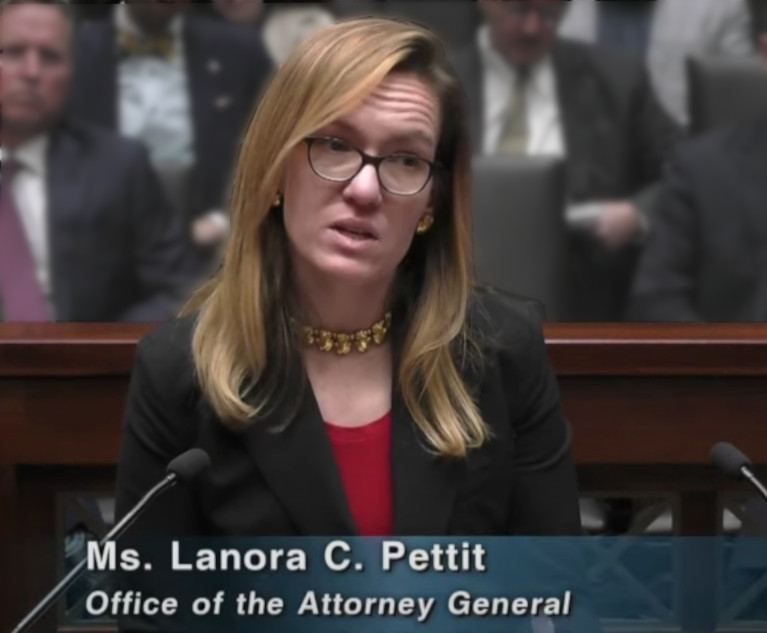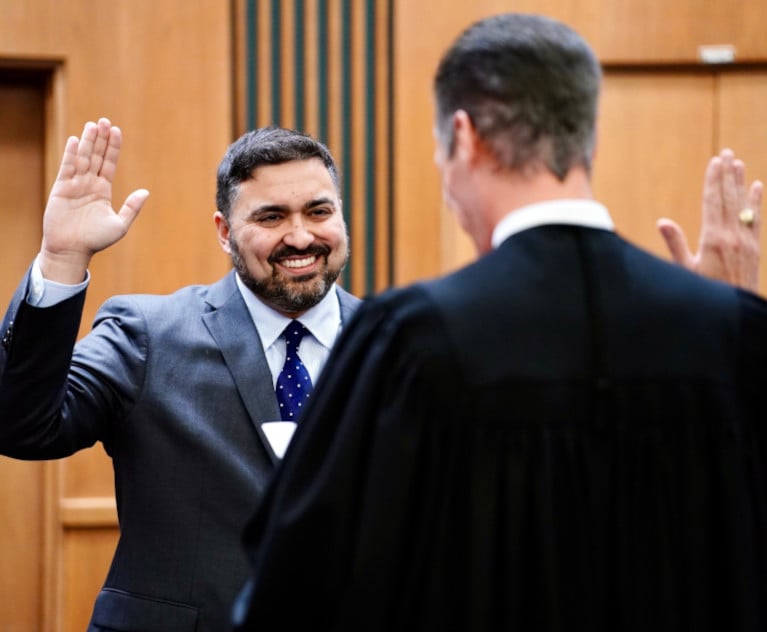Forget the 'R' and 'D': Commission Wants No More Politics in Selecting Texas Judges
Data show there's a trend of judges leaving office voluntarily because they do not want to weather another election process.
January 09, 2020 at 02:55 PM
4 minute read
 Photo: Kzenon/Shutterstock.com
Photo: Kzenon/Shutterstock.com
All but one member of the new Texas Commission on Judicial Selection indicated at the group's first meeting Thursday that they believe partisanship is problematic in the state's method of selecting judges.
Only Sen. Joan Huffman, R-Houston, said she's unconvinced that partisan election of judges must go. But the senator added she planned to keep an open mind as the Judicial Selection Commission this year completes its task to study a number of selection methods, and report back to the Texas Legislature with recommendations for reform.
Much of the commission's first meeting in the Texas Supreme Court building in Austin was devoted to spelling out the problems with the current system.
"You can't solve a problem unless you know what the problem really is," said Chairman David Beck, partner in Beck Redden in Houston.
'I don't care if they are Republicans or Democrats'
Beck said Texas is one of only six states in the nation that uses partisan elections for judges.
"We are losing good, experienced judges," he said. "I don't care if they are Republicans or Democrats. It has nothing to do with their performance. It depends on the issues at the top of the ticket.
Beck also highlighted problems allowing political campaign contributions in judicial elections. Jackson Walker partner Chip Babcock echoed the thought. He said in one of his current cases, opposing counsel gave $4,000 to the judge's campaign, and it made Babcock's client uncomfortable.
But as a First Amendment attorney, Babcock also noted that regulating campaign contributions will face the same legal problems as regulating speech.
It won't be easy, he explained.
Decades of attempted reform
A candidate who can raise the most money from wealthy people and corporations, to put ads on TV, has the best shot at winning the bench in urban areas where voters do not know the judicial candidates, added Former Texas Supreme Court Chief Justice Wallace Jefferson. Instead, Jefferson said the emphasis in judicial elections should be on the merit of the candidates.
But Jefferson indicated that the election of judges is a good thing, too, because a candidate must travel the state and speak with attorneys and people about their concerns.
"I was able to bring innovation from all around the state to the judicial system because there were good ideas," said Jefferson.
Another plus: The 2018 elections brought a racially diverse group of candidates into office, he said.
Texas has tried to reform judicial selection to replace partisanship with merit since at least 1946, said Megan Lavoie, spokeswoman and special counsel for the Texas Office of Court Administration. While most reforms have failed, Lavoie noted, a 2017 law did succeed in eliminating straight-ticket voting for judges, and in 2019 a law created the judicial selection commission to study further changes.
Angela Garcia, chief data officer of the court administration office, said that in the 2018 elections, 12% of the state's appellate and district judges lost their bid for reelection, which is shocking considering the rate is typically 3%. Garcia said data show there's a trend of judges leaving office voluntarily because they do not want to weather another election process. In total, 140 judges left office in 2018: Half of them were voted out of office and 30% decided not to run again, Garcia said.
See the statistics:
Huffman, the commission member who supports partisan races for judges, explained that although she herself is a former district judge, even she struggles to educate herself about all the judicial candidates running in her hometown of Houston. She said that level of research is almost impossible for most voters. And with a dearth of information about candidates, at least the "R" or "D" on the ballot, for "Republican" or "Democrat," gives voters one thing to go on.
While unconvinced that eliminating partisanship was the right decision, Huffman added that she plans to keep an open mind.
She said, "I'm not saying it's not a problem."
This content has been archived. It is available through our partners, LexisNexis® and Bloomberg Law.
To view this content, please continue to their sites.
Not a Lexis Subscriber?
Subscribe Now
Not a Bloomberg Law Subscriber?
Subscribe Now
NOT FOR REPRINT
© 2025 ALM Global, LLC, All Rights Reserved. Request academic re-use from www.copyright.com. All other uses, submit a request to [email protected]. For more information visit Asset & Logo Licensing.
You Might Like
View All


Law Firms Mentioned
Trending Stories
Who Got The Work
J. Brugh Lower of Gibbons has entered an appearance for industrial equipment supplier Devco Corporation in a pending trademark infringement lawsuit. The suit, accusing the defendant of selling knock-off Graco products, was filed Dec. 18 in New Jersey District Court by Rivkin Radler on behalf of Graco Inc. and Graco Minnesota. The case, assigned to U.S. District Judge Zahid N. Quraishi, is 3:24-cv-11294, Graco Inc. et al v. Devco Corporation.
Who Got The Work
Rebecca Maller-Stein and Kent A. Yalowitz of Arnold & Porter Kaye Scholer have entered their appearances for Hanaco Venture Capital and its executives, Lior Prosor and David Frankel, in a pending securities lawsuit. The action, filed on Dec. 24 in New York Southern District Court by Zell, Aron & Co. on behalf of Goldeneye Advisors, accuses the defendants of negligently and fraudulently managing the plaintiff's $1 million investment. The case, assigned to U.S. District Judge Vernon S. Broderick, is 1:24-cv-09918, Goldeneye Advisors, LLC v. Hanaco Venture Capital, Ltd. et al.
Who Got The Work
Attorneys from A&O Shearman has stepped in as defense counsel for Toronto-Dominion Bank and other defendants in a pending securities class action. The suit, filed Dec. 11 in New York Southern District Court by Bleichmar Fonti & Auld, accuses the defendants of concealing the bank's 'pervasive' deficiencies in regards to its compliance with the Bank Secrecy Act and the quality of its anti-money laundering controls. The case, assigned to U.S. District Judge Arun Subramanian, is 1:24-cv-09445, Gonzalez v. The Toronto-Dominion Bank et al.
Who Got The Work
Crown Castle International, a Pennsylvania company providing shared communications infrastructure, has turned to Luke D. Wolf of Gordon Rees Scully Mansukhani to fend off a pending breach-of-contract lawsuit. The court action, filed Nov. 25 in Michigan Eastern District Court by Hooper Hathaway PC on behalf of The Town Residences LLC, accuses Crown Castle of failing to transfer approximately $30,000 in utility payments from T-Mobile in breach of a roof-top lease and assignment agreement. The case, assigned to U.S. District Judge Susan K. Declercq, is 2:24-cv-13131, The Town Residences LLC v. T-Mobile US, Inc. et al.
Who Got The Work
Wilfred P. Coronato and Daniel M. Schwartz of McCarter & English have stepped in as defense counsel to Electrolux Home Products Inc. in a pending product liability lawsuit. The court action, filed Nov. 26 in New York Eastern District Court by Poulos Lopiccolo PC and Nagel Rice LLP on behalf of David Stern, alleges that the defendant's refrigerators’ drawers and shelving repeatedly break and fall apart within months after purchase. The case, assigned to U.S. District Judge Joan M. Azrack, is 2:24-cv-08204, Stern v. Electrolux Home Products, Inc.
Featured Firms
Law Offices of Gary Martin Hays & Associates, P.C.
(470) 294-1674
Law Offices of Mark E. Salomone
(857) 444-6468
Smith & Hassler
(713) 739-1250







